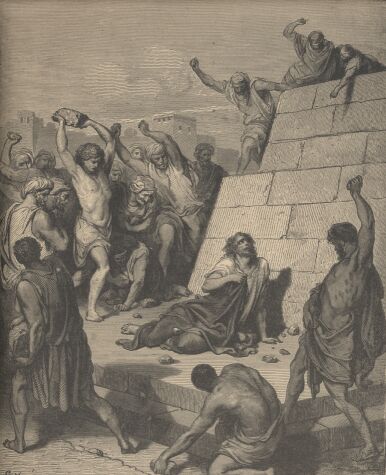THE MARTYRDOM OF ST. STEPHEN.

And Stephen, full of faith and power, did great wonders and miracles among the people. Then there arose certain of the synagogue, which is called the synagogue of the Libertines, and Cyrenians, and Alexandrians, and of them of Cilicia and of Asia, disputing with Stephen. And they were not able to resist the wisdom and the spirit by which he spake. Then they suborned men, which said, We have heard him speak blasphemous words against Moses and against God. And they stirred up the people, and the elders, and the scribes, and came upon him, and caught him, and brought him to the council. And set up false witnesses, which said, This man ceaseth not to speak blasphemous words against this holy place, and the law: for we have heard him say, that this Jesus of Nazareth shall destroy this place, and shall change the customs which Moses delivered us. And all that sat in the council, looking steadfastly on him, saw his face as it had been the face of an angel. Then said the high priest, Are these things so? And he said, Men, brethren, and fathers, hearken: [Stephen here makes his defense, concluding with a terrible, denunciation of the Jews as being stiffnecked and persecutors of their prophets, and as betrayers and murderers of Jesus Christ.] When they heard these things, they were cut to the heart, and they, gnashed on him with their teeth. But he, being full of the Holy Ghost, looked up steadfastly into heaven, and saw the glory of God, and Jesus standing on the right hand of God, and said, Behold, I see the heavens opened, and the Son of man standing on the right hand of God. Then they cried out with a loud voice, and stopped their ears, and ran upon him with one accord, and cast him out of, the city, and stoned him: and the witnesses laid down their clothes at a young man's feet, whose name was Saul. And they stoned Stephen, calling upon God, and saying, Lord Jesus, receive my spirit. And he kneeled down, and cried with a loud voice, Lord, lay not this sin to their charge. And when he had said this, he fell asleep. And Saul was consenting unto his death.—Acts vi, 8-15; vii, 1-2, 54-56; viii, 1.
|